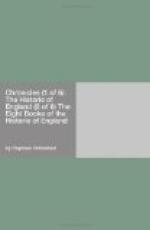How Elfleda king Alfreds daughter (being maried) contemned fleshlie pleasure; the praise of Alfred for his good qualities, his lawes for the redresse of theeues, his diuiding of countries into hundreds and tithings, of what monasteries he was founder, he began the foundation of the vniuersitie of Oxford, which is not so ancient as Cambridge by 265 yeeres; king Alfred was learned, his zeale to traine his people to lead an honest life, what learned men were about him, the pitifull murthering of Iohn Scot by his owne scholers, how Alfred diuided the 24 houres of the day and the night for his necessarie purposes, his last will and bequests; the end of the kingdome of Mercia, the Danes haue it in their hands, and dispose it as they list, Eastangle and Northumberland are subiect vnto them, the Northumbers expell Egbert their king, his death; the Danes make Guthred king of Northumberland, priuileges granted to S. Cuthberts shrine; the death of Guthred, and who succeeded him in the seat roiall.
THE XVJ. CHAPTER.
In the end of the former chapter we shewed what children Alfred had, their number & names, among whome we made report of Elfleda, who (as you haue heard) was maried vnto duke Edelred. This gentlewoman left a notable example behind hir of despising fleshlie plesure, for bearing hir husband one child, and sore handled before she could be deliuered, [Sidenote: The notable saieng of Elfleda.] she euer after forbare to companie with hir husband, saieng that it was great foolishnesse to vse such pleasure which therwith should bring so great griefe.
To speake sufficientlie of the woorthie praise due to so noble a prince as Alfred was, might require eloquence, learning, and a large volume. He was of person comelie and beautifull, and better beloued of his father and mother than his other brethren. And although he was [Sidenote: Will. Malmes.] (as before is touched) greatly disquieted with the inuasion of forren enimies, yet did he both manfullie from time to time indeuour himselfe to repell them, and also attempted to see his subiects gouerned in [Sidenote: King Alfred his lawes.] good and vpright iustice. And albeit that good lawes amongst the clinking noise of armor are oftentimes put to silence, yet he perceiuing how his people were greeued with theeues and robbers, which in time of warre grew and increased, deuised good statutes and wholsome ordinances for punishing of such offenders.
Amongst other things he ordeined that the countries should be diuided into hundreds and tithings, that is to say, quarters conteining a certeine number of towneships adioining togither, so that euerie Englishman liuing vnder prescript of lawes, should haue both his hundred and tithing; that if anie man were accused of anie offense, he should find suertie for his good demeanor: and if he could not find such as would answer for him, then should he tast extremitie of the lawes. And if anie man that was giltie fled before




